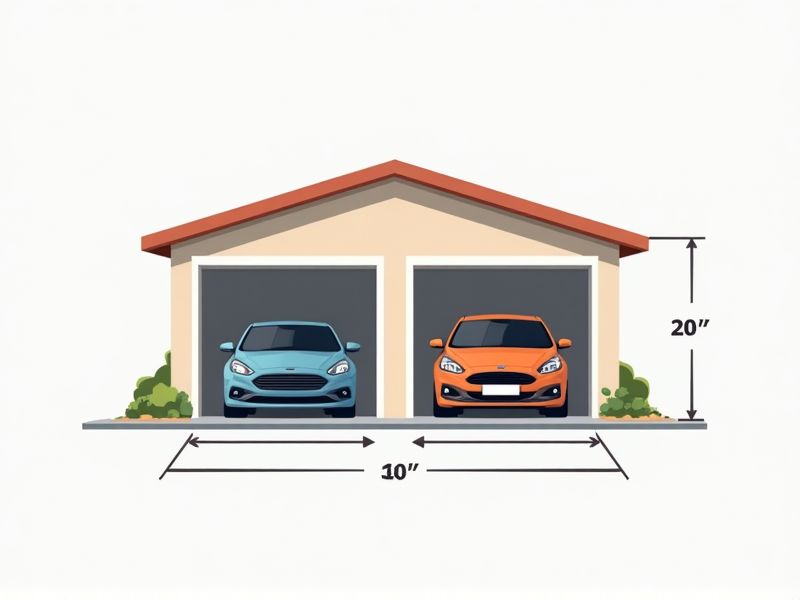
The standard dimensions of a two-car garage typically range from 20 to 24 feet wide and 20 to 24 feet deep. This size allows enough room for two average-sized vehicles, along with some additional space for opening doors and storing items like bicycles or lawn equipment. For example, a common size is 24 feet by 24 feet, which provides extra maneuvering space and storage flexibility. If you drive larger vehicles or want more room for a workbench, opting for the larger end of the standard range is recommended.
Width: 18-20 Feet
The standard width for a two-car garage typically ranges from 18 to 20 feet, providing ample space for two vehicles. This width accommodates most cars comfortably, allowing for easy access to and from the garage. With 20 feet, you gain extra room to maneuver, which can be particularly useful for larger vehicles or additional storage. Opting for a garage width within this range enhances both functionality and convenience for your daily needs.
Depth: 20-24 Feet
A standard two-car garage typically has a depth ranging from 20 to 24 feet, accommodating most vehicle sizes while allowing additional space for workspace or storage. This depth enables comfortable parking without the risk of damage or tight maneuvers, which can be particularly beneficial if you own larger cars or SUVs. The minimum width of a two-car garage generally spans 18-20 feet, providing enough room for easy access to each vehicle's doors. Designing your garage within these dimensions ensures practical usage and increases the overall value of your property.
Door Width: 16 Feet
A standard two-car garage typically features a door width of 16 feet, accommodating most vehicles comfortably. This width allows for easy entry and exit, ensuring sufficient space for even larger SUVs and trucks. With an approximate height of 7 to 8 feet, these garage doors provide ample vertical clearance as well. When planning your garage layout, consider additional space for storage solutions or tools, enhancing overall functionality.
Door Height: 7-8 Feet
A standard two-car garage door typically ranges in height from 7 to 8 feet, ensuring ample clearance for vehicles, including larger SUVs and trucks. This height accommodates most residential vehicles while offering easy access for elevated items in the garage. When selecting a garage door, consider the height in relation to your vehicle dimensions and any potential storage needs. Optimizing door height enhances both usability and aesthetic appeal, making your garage functional and stylish.
Ceiling Height: 8-9 Feet
The standard ceiling height for a two-car garage typically ranges from 8 to 9 feet, ensuring ample vertical space for vehicle entry and storage. This height accommodates most standard vehicles while allowing for overhead storage solutions, such as cabinets or shelving. When designing your garage, consider this measurement to optimize accessibility and functionality. A ceiling height within this range also contributes to better airflow and lighting, enhancing the overall garage environment.
Minimum Clearance: 2 Feet Between Cars
For a standard two-car garage, maintaining a minimum clearance of 2 feet between the vehicles is crucial for easy access and maneuverability. This space allows you to open doors without risking damage to either car and facilitates safe entry and exit. A typical two-car garage dimension is approximately 20 feet wide, providing enough room for comfortable parking and storage. Ensuring proper clearance can enhance the functionality of your garage while promoting safety and convenience in your daily routine.
Storage Space: 2-4 Feet On Sides
A standard two-car garage typically provides 2 to 4 feet of space on each side, optimizing the layout for both vehicle parking and storage solutions. This design allows for easy access to tools, bicycles, or seasonal decorations, efficiently utilizing the available square footage, usually ranging from 400 to 600 square feet in total. With thoughtful organization, you can maximize vertical storage options, such as wall-mounted cabinets and shelving, to keep the floor space clear. By prioritizing these dimensions, your garage can function as a multifaceted space that balances vehicle housing with practical storage needs.
Driveway Length: 20-30 Feet
A standard two-car garage typically requires a driveway length ranging from 20 to 30 feet, ensuring adequate space for vehicle maneuverability. With an average car length of about 14 to 16 feet, this driveway dimension allows for safe parking and easy access to the garage. If you plan on accommodating larger vehicles or have additional requirements, such as space for turnarounds or extra parking, consider extending the driveway beyond the standard length. Investing in a longer driveway can enhance convenience and improve your home's overall functionality.
Door Type: Roll-Up Or Sectional
A standard two-car garage typically features either a roll-up or sectional garage door, each offering distinct advantages. Roll-up doors, often made from steel or aluminum, provide a compact solution as they coil overhead, maximizing space for parking and storage. In contrast, sectional doors consist of multiple panels that hinge together, allowing for more customization in terms of design and insulation, which contributes to energy efficiency--up to 20% less energy loss compared to standard doors. When choosing between these options, consider your garage's layout, insulation needs, and aesthetic preferences to find the perfect fit for your home.
Floor Slope: 1/8 Inch Per Foot For Drainage
A standard two-car garage typically requires a floor slope of 1/8 inch per foot to ensure proper drainage. This gradient aids in directing rainwater and melted snow away from the garage, preventing potential water pooling and damage. If your garage measures 20 feet in length, the total slope should amount to 2.5 inches from one end to the other, facilitating effective water runoff. Maintaining this specification not only enhances your garage's functionality but also contributes to the longevity of the flooring materials.
